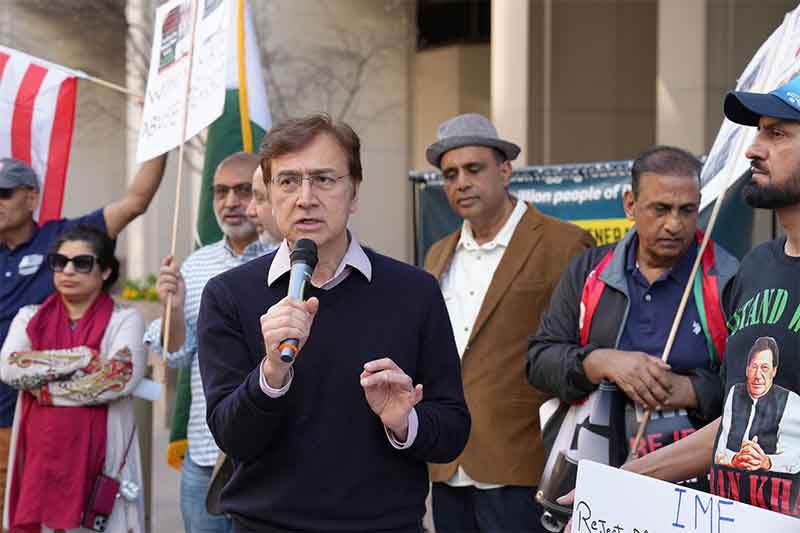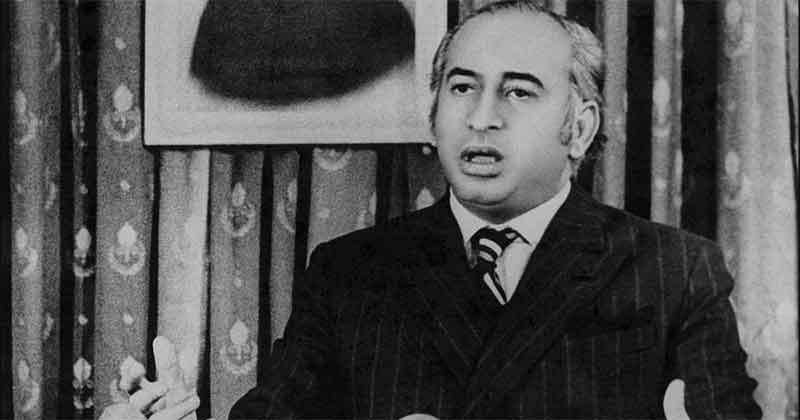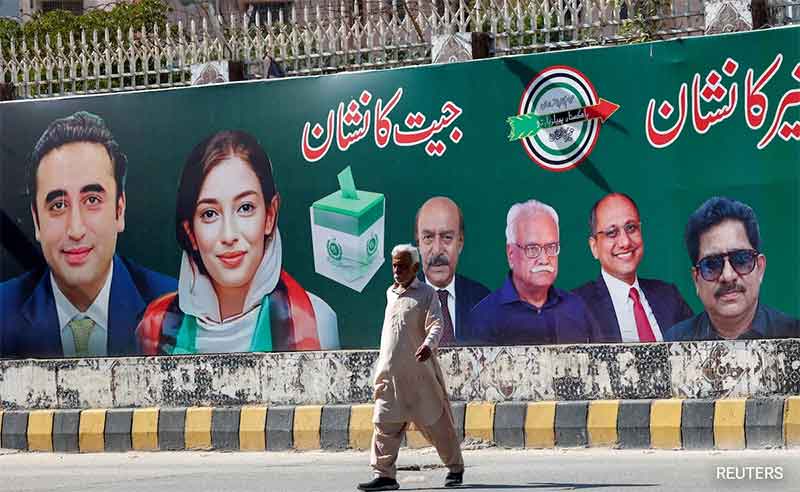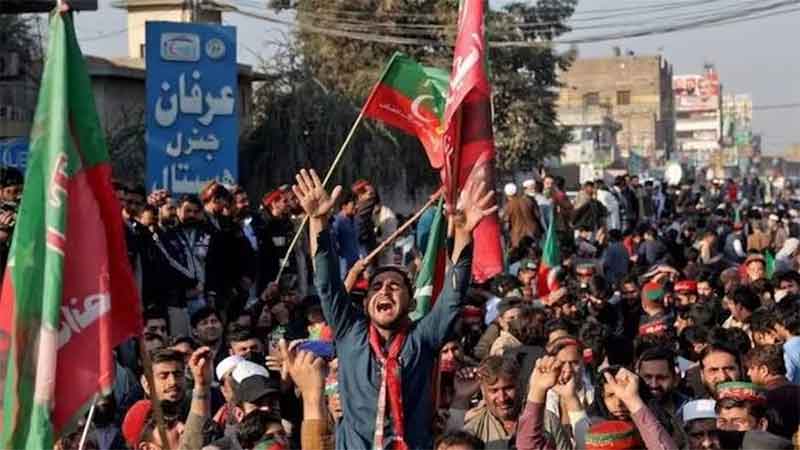
Politics in Pakistan is again creating turmoil.
Media reports said:
Former Prime Minister Imran Khan’s close aide and Pakistan Tehreek-e-Insaf (PTI) leader, Shahbaz Gill’s room at Parliament Lodges was raided by police contingents in the presence of Gill who was brought to the location amid strict security measures.
The police team led by the senior superintendent of police (SSP) found arms in his room and the team also confiscated different cards and other items, according to ARY News.
However, Shahbaz Gill stated that it was not his weapon and claimed that someone else entered his room in his absence.
The condition of his room was changed when he was brought back to the Parliament Lodges, Gill said, expressing suspicion that someone else had placed the pistol in his room after his arrest.
Earlier in the day, an Islamabad court handed PTI leader Shahbaz Gill to Islamabad police for two-day physical remand after he was shifted from PIMS. The court after listening to the arguments reserved its verdict and later directed the police to present Gill before the court on August 24, ARY News reported.
Gill was arrested on charges of colluding with a private Pakistani TV news channel in carrying out propaganda against the state.
Imran Granted Pre-arrest Bail In Anti-terror Case
The Islamabad High Court (IHC) has granted pre-arrest bail to Imran Khan till August 25 after he was booked under the Anti-Terrorism Act (ATA) for threatening an additional sessions judge and senior police officers of the Islamabad Police at a rally in the federal capital’s F-9 Park.
During the hearing, the Islamabad High Court ordered Imran Khan to appear before the concerned anti-terrorism court on August 25. Until then, the court said, police must not arrest him.
This comes as PTI legal team on Monday filed a pre-arrest bail plea for Imran Khan after a first information report (FIR) was registered against him in Islamabad High Court.
Imran’s lawyers, Babar Awan and Faisal Chaudhry, filed a petition seeking pre-arrest bail on his behalf in a terrorism case registered for ‘threatening’ a female judge and senior police officers in a public rally.
As per the petition, Imran Khan was being targeted by the ruling Pakistan Democratic Movement (PDM) for being blunt against corruption and corrupt politicians.
The petition also added that the most recent FIR against the PTI chairman was “politically motivated” and it added that Imran had been “falsely” involved with “mala fide intention and ulterior motives to humiliate” him.
Another point which was highlighted in the plea was the assurance that if granted protective bail there will be “no likelihood” of Imran absconding or tampering with prosecution evidence.
Imran Claims Government’s YouTube Block Aimed To Censor Him
Imran Khan accused the government of temporarily blocking YouTube to deny live access to his speech, at a political rally.
Khan has been making fiery speeches to gatherings across the South Asian nation, as he pushes for new elections after being ousted from power in April through a parliamentary vote.
The Youtube-blocking accusation came after a ban on Saturday by the electronic media regulator on the live broadcast of Khan’s speeches, citing what it called his “hate speech” against state institutions.
“Imported government blocked YouTube midway through my speech,” Khan said on Twitter.
A spokesman for internet regulator Pakistan Telecommunication Authority did not immediately respond to a request for comment.
Reuters could not immediately reach Khan to seek comment.
‘Provocative Statements’
Khan’s speeches were “prejudicial to the maintenance of law and order, and likely to disturb public peace and tranquility”, the Pakistan Electronic Media Regulatory Authority (PEMRA) said, in a statement on Saturday.
It accused Khan of “continuously … leveling baseless allegations and spreading hate speech through his provocative statements against state institutions”.
It prohibited live broadcasts of his speeches by news channels, with immediate effect, but made an exception for recorded speech.
Pakistan’s government, police and its powerful army have been among the targets of Khan’s remarks.
Soon after Saturday’s television ban, Khan’s party vowed to go live on “500+ YouTube and Facebook channels”.
However, many Pakistani users of social media reported problems in accessing YouTube on Sunday, just as Khan was about to address a gathering in the garrison city of Rawalpindi.
In those comments, Khan said he was being censored for not accepting the current coalition government, which had voted him out of power.
The television ban came a day after Khan’s threats to Islamabad’s police chief and a female judge over what he called the arrest and alleged torture of a close aide who faces sedition charges, for urging the military’s lower ranks to defy the orders of the superiors.
Imran Booked Under Anti-terrorism Act
Earlier reports said:
Imran Khan has been booked under the Anti-Terrorism Act for threatening police, judiciary and other state institutions at his Islamabad rally a day ago, it emerged on Sunday.
The case surfaced hours after Interior Minister Rana Sanaullah on Sunday said that the government was mulling to file a case against 69-year-old Khan over his provocative speech delivered on Saturday night in the F-9 Park of the national capital.
According to the copy of the first information report, which has been seen by PTI, the case was registered at the Margalla Police Station of Islamabad at 10pm on Saturday under Section 7 of the Anti-Terrorism Act (punishment for acts of terrorism).
The FIR reads that Khan in his speech had “terrorized and threatened top police officials and a respected female additional sessions judge” with the aim to stop them from performing their functions and abstain from pursuing any action against any individual related to his Pakistan Tehreek-e-Insaaf party
It says that Khan’s speech had spread fear and uncertainty among the police, judges and the nation.
In his address, Khan had threatened to file cases against top police officials, a woman magistrate, Election Commission of Pakistan and political opponents over the treatment meted out to his aide Shahbaz Gill, who was arrested last week on charges of sedition.
He had also taken exception to Additional District and Sessions Judge Zeba Chaudhry, who had approved Gill’s two-day physical remand at the request of the capital police, and said she should “prepare herself as action would be taken against her”.
Earlier at a Press conference, Interior Minister Sanaullah said that the government was holding legal consultations before launching any case against Khan. He alleged that Khan’s speech was a continuation of a trend to target the army and other institutions.
“This is all happening in continuation — from a campaign after the Lasbela incident when six army officers were killed followed by Gill’s attempt to incite army ranks to go against their top command and then Imran threatening a woman judge and police officials for performing their duties as per the law,” the minister said.
His remarks came after Pakistan’s electronic media watchdog banned satellite television channels from broadcasting live speeches of Khan following his provocative address on Saturday night.
The Pakistan Electronic Media Regulatory Authority (PEMRA) in a communiqué issued on Saturday said that TV channels despite repeated warnings had failed to implement a time-delay mechanism to stop the broadcast of material against “state institutions”.
“It has been observed that Mr Imran Khan, Chairman Pakistan Tehreek-e-Insaf, in his speeches/statements is continuously alleging state institutions by leveling baseless allegations and spreading hate speech through his provocative statements against state institutions and officers which is prejudicial to the maintenance of law and order and is likely to disturb public peace and tranquility,” it said.
According to the statement, after analyzing the content of Khan’s speech, it has been observed that the content was aired live by the licensees without an effective time delay mechanism.
“The competent authority i.e. Chairman PEMRA in view of the above-mentioned background and reasons hereby prohibits broadcast of live speech of Khan on all satellite TV channels with immediate effect,” it added.
Reacting sharply to the ban imposed on the PTI chairman, his party said the government of Prime Minister Shehbaz Sharif has a fascist regime.
“Imported fascists are trying to ban Imran Khan’s speeches on TV. They have lost the battle completely and now using fascism; they will fail! #HelpPakistan by raising our voices against fascists!,” Khan’s party tweeted.
Saturday’s rally was organized by PTI to express solidarity with Gill and stage a protest against what Khan claimed was “blatant fascism” prevalent under the “imported regime” of Prime Minister Sharif.
During the rally, Khan didn’t spare powerful Army, calling it “neutrals”, and urged his supporters to stand with the nation rather than the “gang of thieves”, in a veiled reference to the coalition government.
He also lashed out at the judiciary, terming them as “biased”.
While the army has not responded to his barb, Pakistan Muslim League-Nawaz, Pakistan Peoples Party, Jamiat Ulema-e-Islam Fazl and Mutahida Quami Movement Pakistan in a statement asked the judiciary to take legal action against Khan and his aides for threatening a female judge and intimidating police officers.
Since he was ousted from power in April, the cricketer-turned politician has repeatedly claimed that the no-trust motion against him was the result of a “foreign conspiracy”.
Khan has also emphasised that his party would not deal with or accept the “imported government” headed by Prime Minister Sharif.
Meanwhile, a defiant Khan addressed a rally at Rawalpindi’s Liaquat Bagh ground on Sunday night.
“Now PEMRA is also in the game. What has Imran Khan done? His only crime is that he is not accepting this imported government,” Khan said responding to the PEMRA banning of his live speeches.
He also talked about the deteriorating economic situation and inflation, saying the country’s army chief had to go to countries like Saudi Arabia to get loans.
“The only way to bring the country out of the current situation is to hold fair and free elections,” he said.
Pakistan’s Imran Khan Is Now the Target of Forces He Once Wielded
A New York Times report said on Aug. 23, 2022:
Former Prime Minister Imran Khan’s allies have been arrested. Media outlets and public figures considered sympathetic to him have been intimidated or silenced. He has been hit with charges under Pakistan’s antiterrorism act and faces the prospect of arrest.
For weeks, Pakistan has been gripped by a political showdown between the ruling establishment and Mr. Khan, the former cricket star turned populist politician who was ousted from the prime minister post this year. The drama has laid bare the perilous state of Pakistani politics — a winner-take-all game in which the security forces and the justice system are wielded as weapons to sideline those who have fallen out of favor with the country’s powerful military establishment or political elite.
That playbook has been decades in the making, and it has turned the country’s political sphere into a brutal playground in which only a few elite leaders dare play. It has also rendered the Pakistani public deeply disillusioned with the political system and the handful of family dynasties that have been at the top of it for decades.
The report said:
Mr. Khan’s own meteoric rise from the fringes of politics to the prime minister’s office in 2018 was a showcase for how hard-bitten Pakistan’s politics have become: His competitors were winnowed from the electoral field by criminal charges, and by threat and intimidation from the security forces. Once in office, he and his supporters employed those same tools to harass and silence journalists and political opponents who criticized him.
Even after falling out with military leaders and being removed from office earlier this year in a no-confidence vote, the charismatic politician has been able to keep himself and his party at the center of Pakistani politics. It is a demonstration of his ability to tap into the public’s deep-seated frustration with the political system and wield the kind of populist power once relegated to Pakistani religious leaders.
That popularity has alarmed the new government, led by Shehbaz Sharif, and the military establishment, which began picking off his supporters and have now turned the justice system on Mr. Khan himself. But the well-worn playbook seems to be doing little to keep him in check, at least so far, and some analysts fear the showdown could erupt into violence.
“The former prime minister has been accused of threatening government officials — they are serious allegations bringing the confrontation between him and the federal government to a head,” said Zahid Hussain, an Islamabad-based political analyst and a columnist for Dawn, the country’s leading daily. “Any move to arrest him could ignite an already volatile political situation.”
The New York Times report added:
Since Pakistan’s founding 75 years ago, the nuclear-armed nation has been plagued by political volatility and military coups. Even in the calmest of times, the country’s military establishment has been the invisible hand guiding electoral politics, ushering its allies into positions of power and pushing away rivals.
The last prime minister to be driven from office before Mr. Khan, Nawaz Sharif — the older brother of the current prime minister — was disqualified from holding office in 2017 over corruption charges in a controversial verdict by the Supreme Court. The elder Sharif sought refuge in London, joining a long line of political figures effectively exiled from Pakistan under the threat of criminal charges.
In an echo of that political script, on Sunday Mr. Khan was charged under Pakistan’s antiterrorism act after giving a speech to thousands of supporters in the capital, Islamabad, in which he threatened legal action against senior police officers and a judge involved in the recent arrest of one of his top aides.
The charges intensified the showdown between the government and Mr. Khan, and added to a wave of reports of harassment, arrest and intimidation aimed at journalists and allies of Mr. Khan in recent weeks that many view as a coordinated effort by the authorities to dampen his political prospects.
But the crackdown appears to have heightened Mr. Khan’s popularity, analysts say, bolstering his claims that the military establishment conspired to topple his government in April.
“What differentiates this moment from previous moments is the amount of sheer street power Khan has,” said Madiha Afzal, a fellow at the Brookings Institution. “And street power makes a difference in Pakistan even when it does not translate into electoral votes.”
The New York Times report said:
In recent months, Mr. Khan has regularly drawn tens of thousands of supporters onto the streets, where he has lashed out at the current government and the military. The overwhelming public support has buoyed his hopes for a political comeback, and he has demanded new elections, refusing political dialogue with his rivals.
The crackdown on Mr. Khan and his supporters has intensified frustrations among young, social-media-savvy Pakistanis and the older generation alike over the entrenched corruption and all-powerful hand of the military in the country’s political system.
It said:
In the past two months, Mr. Khan has managed to parlay his widespread support into electoral prowess. His party, Pakistan Tehreek-e-Insaf, won sweeping victories in local elections in Punjab — a province that has often served as a bellwether for national politics — and in the port city of Karachi.
And however out of favor he may be with the military’s top brass, Mr. Khan has retained sympathizers within the ranks.
A cohort of retired military officials have attended pro-Khan demonstrations in recent months. And his chief of staff, Shahbaz Gill, went so far as to urge officers to refuse to obey their leaders during a live TV appearance, leading to his arrest and accusations that he has been trying to incite rebellion within the military.
Mr. Khan says that Mr. Gill has been tortured and sexually abused while in custody, though senior government ministers and Islamabad police officials deny that claim.
Many fear that if Mr. Khan is ultimately arrested, it will worsen the political turmoil that has embroiled the country in recent weeks.
Mr. Khan’s supporters have warned that Mr. Khan’s arrest would be a “red line,” and as news of the charges spread on Sunday night, hundreds of them gathered outside his palatial hillside residence on the outskirts of Islamabad and vowed to resist.
“If this red line is crossed, we will be forced to shut down the country,” said Sayed Zulfikar Abbas Bukhari, a close aide of Mr. Khan’s. “Arresting him will result in a nationwide revolt.”
Pakistan’s Generals Want To Muzzle Imran Khan. It May Backfire
A Time report said on Aug 22, 2022:
Khan took to mass, highly-produced rallies for his centrist Pakistan Tehreek-e-Insaf (PTI) party to rail against political opponents, whom he accused of hatching a U.S.-backed coup to unseat him. These demonstrations have only grown larger and more vitriolic in recent weeks as the cricketing icon turned his ire on the military establishment that aided his political rise before deserting him.
So far, Khan remains free and his supporters have threatened to stage mass demonstrations should he be taken into custody. “If Khan is actually arrested, all bets would be off and the country could see heightened risks of political violence in major cities,” says Michael Kugelman, the deputy director of the Asia Program at the Woodrow Wilson Center. “Khan enjoys backing from a rabid support base that would not sit quietly.”
The report said:
Gill was charged with sedition — a crime which carries the death penalty—and claims he was tortured under interrogation. (One senior PTI figure provided photos of bruises Gill allegedly suffered during detention, though TIME was unable to independently verify the contents.)
Khan came to the defense of his friend by criticizing the inspector-general of Pakistan’s police force and the judge deemed responsible for Gill’s arrest. “You also get ready for it, we will also take action against you,” Khan reportedly said. “All of you must be ashamed.”
Pakistan’s judiciary subsequently deemed those comments — and threats to sue the police and the judge — an explicit threat and filed charges against him. However, the Islamabad High Court granted Khan “protective bail” until Thursday, which blocks his potential arrest for now.
Khan has over 17 million followers on Twitter, which is higher than the ratings of many top nightly news shows in Pakistan.
Certainly, Khan’s predicament is only the latest salvo as nuclear-armed Pakistan lurches from crisis to crisis, with potentially grave implications for regional and global security. On top of a hyper-polarized political environment, the nation of 230 million people is blighted by runaway inflation that reached 24.9% in July and a government that has been unable to improve the economy and heavy-handed with opponents. On Aug. 29, the IMF is due to meet to negotiate yet another bailout. But the specter of political unrest risks wobbling an already precarious economic tightrope. “No matter how you slice it, it’s a very uneasy and volatile moment for Pakistan,” says Kugelman.
The report added:
Despite an often tetchy relationship, Pakistan is an invaluable security partner for the U.S. regarding neighboring Afghanistan, where the Taliban have been back in power for a year.
Instability gripping Pakistan — including rumors of splits between pro- and anti-Khan factions in the military — undermines this invaluable security apparatus. On Aug. 10, the Pakistani Taliban claimed it had regained control of a part of Swat district in the country’s far north. It’s a precarious time for Pakistan’s military to be divided and distracted.
For Samina Yasmeen, director of the Centre for Muslim States and Societies at the University of Western Australia, the new government of Prime Minister Shahbaz Sharif of the center-right PML-N party — brother of Khan’s longtime nemesis Nawaz Sharif — has made the mistake of allowing Khan to “whip up hysteria” but now faces “even more instability” by clumsily cracking down. “It’s not simply the fact that Pakistan is a nuclear state,” she says. “It’s that this state has a lot of people in it. If there are clashes, then you really don’t know where it’s going to go.”
Tellingly, Khan has toned down his anti-U.S. broadsides in recent weeks, presumably leaving the door open to mend relations with Washington should he engineer a miraculous return to power. Instead, he’s dialed up attacks against the military, which he sardonically dubbed “neutrals” in response to statements from brass hats insisting they don’t meddle in politics. Even the figures in the ruling PML-N have now adopted the quip, hammering home the fact that the generals who have ruled Pakistan for half its 75-year history remain kingmakers today.
The charges against Khan have in particular galvanized his supporters’ enmity against Pakistan Army chief General Qamar Javed Bajwa, who they believe was a big driver of the 69-year-old Khan’s ouster. “Bajwa’s transformation in the eyes of Khan’s supporters from revered to reviled … is one of the most striking takeaways from this ongoing saga,” says Kugelman.
The reality is, of course, that Khan’s path to power was possible because the military backed him and then he lost power when they withdrew their support. Overall, the reputation of the generals has taken a hit across the political spectrum. When six senior army officers including a top general died in a helicopter crash in early August, the overwhelming reaction on social media was far from sympathetic, with many mockingly expressing condolences for the aircraft rather than the lives lost.
Pakistani society has rarely been so polarized, with half the country treating Khan as a savior and half as the devil incarnate. “Effectively, what he’s done is divided the country,” says Yasmeen. “It’s very much like Trump [in the U.S.]. And if the United States hasn’t fully recovered yet, how can a country like Pakistan recover?”
The question is whether the generals will sit back if widespread protests erupt amid a brewing economic catastrophe. Pakistan’s military has willingly seized power when they thought things were spiraling out of control, most recently in 1999. But the generals worked out that they preferred to pull the strings from the shadows. The question is whether this view has changed. “I can’t see the military taking over,” says Yasmeen, “But then part of me thinks, it’s gone so bad, could there be some [in the army] who think it would be the right thing?”















































